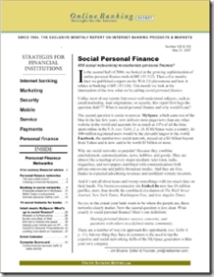Last week, I promised to provide more details on the conclusions in our latest Online Banking Report, Social Personal Finance: Will social networking revolutionize personal finance? It was mailed to subscribers last Friday, so it should be making its way through inter-office mail as we speak (or download here).
Here are the major themes/conclusions from the report:
- Social networks are the new main street; so banks that want to be where their customers are should NOT ignore social networks.
- There are many ways to bring social networking concepts into mainstream banking sites, for instance blogs and forums allow conversations to take place with both customers and employees participating.
- The leaders in the space now are startups such as Wesabe and Lending Club. But what they gain in social networking savvy, they more than give back in lack of trust. So financial institutions are still incredibly relevant in social personal finance.
- In the future, social networks may become so trusted that they can function as a virtual credit union, bringing together members to provide each other with financial services (e.g., P2P lending) or using their clout to negotiate deep discounts with financial providers (e.g., affinity credit cards).
Social personal finance innovators profiled in the report include:
 Buxfer — Named OBR Best of the Web in the report for several pioneering features, including login via third-party APIs, transaction input via email, file appending, Google gadget, and budget alerts
Buxfer — Named OBR Best of the Web in the report for several pioneering features, including login via third-party APIs, transaction input via email, file appending, Google gadget, and budget alerts- Wesabe — Also named OBR Best of the Web for its integration of personal spending records with the wider community
We also looked at Mint, Geezeo, Lending Club, Wells Fargo, and Intuit's new Personal FinanceWorks and Small Business FinanceWorks.
—-
For more information on the report see the landing page here or download the abstract here. And for Colin Henderson's take at The Bankwatch, go here.
